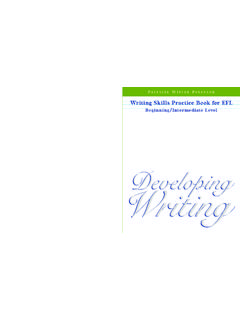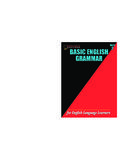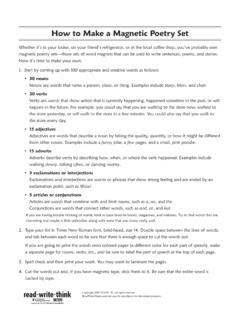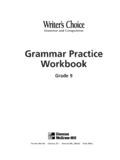Transcription of SPANISH O ESPAÑOL EN MARCHA - European literature
1 1. SPANISH . N U E VO. COURSE. ESPA OL. EN MARCHA . STUDENT'S BOOK. Francisca Castro Vi dez Pilar D az Ballesteros Ignacio Rodero D ez Carmen Sardinero Francos About Nuevo Espa ol en MARCHA NUEVO ESPA OL EN MARCHA is a four-level SPANISH course which covers the contents of levels A1, A2, B1 and B2 of the Common European Framework of Reference for Languages. There is also an edition with levels A1 and A2 in a single volume, entitled Nuevo Espa ol en MARCHA B sico. After completing this first volume, students will be capable of basic but correct communication in the past (pret rito indefinido), present and future (voy a + infinitive) and will know approximately 1,000.
2 Basic words. They will also be able to give basic information about themselves and others and function in a variety of . practical situations. 1 Title page Presents the contents of the unit. 5 Annexes Pairwork activities Grammar, vocabulary and practice exercises. Regular and irregular verbs. Transcriptions.. 4 Self-assessment Activities designed for revision and consolidation of the objectives of the unit, with a test which the student can use to evaluate his or her progress according to the descriptors of the European Language Portfolio.
3 2 Sections A, B and C. The language content outlined at the start of each section is presented, developed and practised. Each section follows a carefully graduated order from the presentation of sample language to a final production exercise. Throughout the unit, the student will be able to practise the four skills (reading, listening, writing and speaking) and also work in depth on grammar, vocabulary and pronunciation using a series of tasks ranging from strictly controlled to free.. 3 Section D Communication and culture The object here is to develop the student's communication skills and also his or her sociocultural and intercultural competences.
4 Activities are grouped by skills: reading, listening, writing and speaking. Contenidos TEMA A B C D P G. Antes Hola! Me llamo C mo se escribe? Mapas de Espa a y 8. Maribel C mo se pronuncia? Am rica Latina de empezar Greetings and The alphabet. Maps and people. introductions in class. Spelling. Saying your name. Language for the classroom. Unidad 1 Encantado! A qu te dedicas? Cu l es tu n mero de Comunicaci n y cultura 15. Saying hello and Jobs: gender. m vil? Ways of addressing Saludos introducing someone.
5 Present of regular verbs. Asking for and giving people (t and usted). Gender of adjectives of Present of irregular verbs: phone numbers and nationality. ser and estar. addresses. T and usted. Numbers 0-20. Pronunciaci n y ortograf a: Intonation in questions. Unidad 2 Est s casado? D nde est n mis gafas? Qu hora es? Comunicaci n y cultura 25. Introducing the family. Prepositions of place: Asking and telling the The Hispanic family: Familias Personal information. debajo, encima, al lado, time. celebrations.
6 Plural of nouns. delante, detr s, entre, Timetables around the en, a la derecha, a la world. izquierda. Numbers 21-5000. Possessive adjectives. Demonstrative pronouns. Pronunciaci n y ortograf a: Stress. Unidad 3 Rosa se levanta a las Estudias o trabajas? Qu desayunas? Comunicaci n y cultura 35. siete Days of the week. Talking about breakfast. SPANISH habits and El trabajo Talking about daily Talking about work: place, timetables. routines. job and hours. Pronunciaci n y ortograf a: Reflexive verbs: /g/.
7 Levantarse, acostarse. Present of irregular verbs: empezar, volver, ir, salir. Prepositions of time: a, de, desde, hasta. Unidad 4 D nde vives? Interiores Visita a C rdoba Comunicaci n y cultura 45. Describing a house. Furniture and household Booking a hotel. Types of houses in Spain. idad La 2casa Ordinals: 1 - 10 . objects. Patios. Definite articles (el, la, los, las) and indefinite Pronunciaci n y ortograf a: articles (un, una, unos, /k/. unas). Hay / Est (n). Unidad 5 Comer fuera de casa Te gusta el cine?
8 Receta del Caribe Comunicaci n y cultura 55. Ordering food in a Vocabulary: free time. Regular affirmative SPANISH and SPANISH - idad 2. Comer restaurant. The verb gustar. imperatives. American food. SPANISH cooking. Writing an advertisement. Giving and understanding Eating out. instructions. Products from America? Pronunciaci n y ortograf a: /b/. TEMA A B C D P G. Unidad 6 C mo se va a Goya? Cierra la ventana, por Mi barrio es tranquilo Comunicaci n y cultura 65. Buying a metro ticket. favor Discovering the SPANISH cities.
9 Idad 2. El barrio Instructions on using the Irregular affirmative neighbourhood where metro. imperatives. we live. Giving instructions. Ser and estar. Asking favours: Puede(s)+ infinitive? Pronunciaci n y ortograf a: /r/ and /rr/. Unidad 7 D nde quedamos? Qu est s haciendo? C mo es? Comunicaci n y cultura 75. Arranging a meeting over Talking about things that Physical and character Young SPANISH and idad 2. Salir con the phone. are happening: Estar descriptions. SPANISH -American people Arranging to meet + gerund (+ reflexive and their free time.)
10 Los amigos someone. pronouns). Accepting or rejecting an invitation. Pronunciaci n y ortograf a: Leaving a message. intonation in exclamations. Unidad 8 Por favor, para ir a la Qu hizo Rosa ayer? Qu tiempo hace hoy? Comunicaci n y cultura 85. catedral? Pret rito indefinido of Talking about the On holiday in Spain. idad De 2 Asking for and giving regular verbs. weather. directions. Pret rito indefinido of Months and seasons of vacaciones City vocabulary: irregular verbs: ir, ser, the year. chemist's, post estar.





